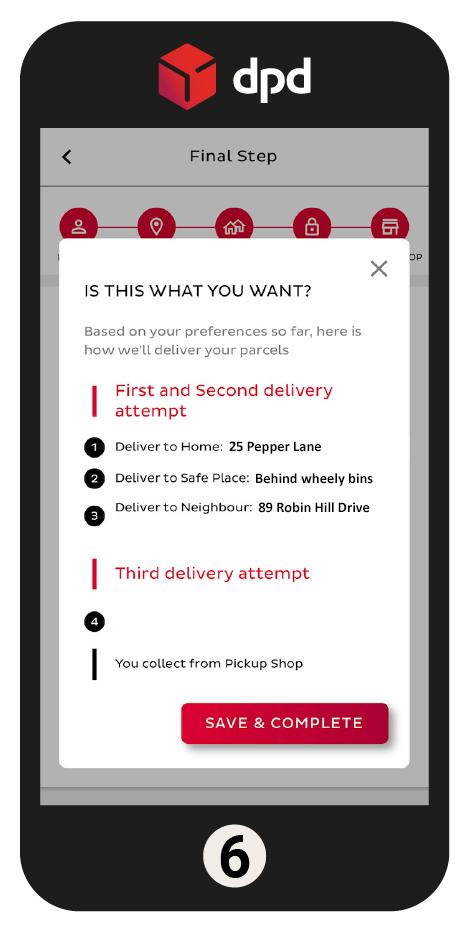Dpd Not Received Time Slot
Dpd Not Delivered In Time Slot, riverdale time slot 2018, r730 memory slots, casino slots raspberry pi. Connect With Facebook Connect. 'We've received your order details, but have not yet received your parcel' So I ordered between 14:00-14:15 and I got an email confirmation just around 19:00 7pm UK time. Got all my promo codes etc got a DPD delivery date too (which says we'll deliver your OC parcel TOMORROW 18th September and we will give you a 1 hour time slot at 11am).
DPD Delivery Email Virus removal guide
What is DPD Delivery Email Virus?
'DPD Delivery Email Virus' is one of many spam email campaigns used to proliferate the DanaBot trojan. Users receive a fake notification regarding delivery of a package from the DPD delivery company. They are encouraged to check the delivery status by clicking 'Run Parcel Track', however, the link leads to download of an archive containing a malicious .js (JavaScript) file.
Dpd Not Received Time Slots
As mentioned above, users are presented with a link that supposedly allows them to track the status of packages. After clicking the link, they are prompted with download of an archived JavaScript file. Opening this file leads to infiltration of the DanaBot trojan. The same email also offers download of a DPDgroup application. The 'Find out more' link also leads to the same JavaScript file download. As mentioned, this email is presented as a notification from DPD - a legitimate delivery company. Clearly, this legitimate organization has nothing to do with the 'DPD Delivery Email Virus' spam campaign. Cyber criminals often hide behind names of popular companies and governmental agencies. They do this to increase the number of infections - users are much more likely to open files when the sender is familiar to them. DanaBot is essentially a banking trojan. Its main purpose is to gather login details and passwords from bank account websites. DanaBot hijacks browsers and modifies bank websites so that all entered logins/passwords are saved to a remote server controlled by cyber criminals. In addition, DPD Delivery Email Virus takes a screenshot of the victim's desktop, records a list of existing files and detailed system information. This data is also saved to the remote server. DanaBot's developers aim to generate as much revenue as possible and, thus, it is highly probable that hijacked accounts will be misused through money transfers, online purchases, and so on. The presence of this virus can lead to significant financial loss and serious privacy issues. Therefore, if you have already opened 'DPD Delivery Email Virus' campaign emails, you should immediately delete downloaded files, scan the system with a reputable anti-virus/anti-spyware suite, and eliminate all threats.
| Name | DPD parcel delivery virus |
| Threat Type | Trojan, Password stealing virus, Banking malware, Spyware |
| Symptoms | Trojans are designed to stealthily infiltrate victim's computer and remain silent thus no particular symptoms are clearly visible on an infected machine. |
| Distribution methods | Infected email attachments, malicious online advertisements, social engineering, software cracks. |
| Damage | Stolen banking information, passwords, identity theft, victim's computer added to a botnet. |
| Malware Removal (Windows) | To eliminate possible malware infections, scan your computer with legitimate antivirus software. Our security researchers recommend using Malwarebytes. |
DanaBot shares many similarities with Hancitor, TrickBot, Emotet, Adwind, and many other trojans distributed using spam campaigns. Their behavior might slightly differ (some gather personal information, others cause chain infections - one virus distributes another), but all of these viruses pose a direct threat to your privacy and computer safety. Therefore, eliminate them immediately.
How did DPD Delivery Email Virus infect my computer?
'DPD Delivery Email Virus' campaign proliferates a malicious JavaScript file. Once opened, this file executes commands that download and install DanaBot into the system. Almost all spam email campaigns are based on an identical malware distribution model - cyber criminals present malicious files (in most cases, Microsoft Office documents) as legitimate, thus often tricking users into downloading and opening them. Note that DanaBot malware works on the Microsoft Windows Operating System only, and users of other platforms have nothing to worry about.
How to avoid installation of malware?
To prevent this situation, be very cautious when browsing the Internet. Think twice before opening email attachments. If the file is not relevant or has been received from a suspicious/unrecognizable email address, it should never be opened. Furthermore, have a reputable anti-virus/anti-spyware suite installed and running, since these tools can detect and terminate malicious files before they do any damage. Keep installed applications and operating systems up-to-date. The main reasons for computer infections are lack of knowledge and careless behavior, and the key to safety is caution. If you have already opened a 'DPD Delivery Email Virus' attachment, we recommend running a scan with Malwarebytes for Windows to automatically eliminate infiltrated malware.
Text presented in the 'DPD Delivery Email Virus' email message:
Subject: Your parcel is on its way
We’ll deliver your BT parcel on
Your parcel is on its way a 1 hour time slot has been selected for delivery once your parcel has been loaded on the van, usually by 1:00pm. Click run parcel track to get accurate delivery time or rearrange delivery.
Please note, our driver is unable to leave this item safe.
Run Parcel Track
Your parcel: -
Download our app
Never miss a parcel delivery from your favourite DPDgroup companies, DPD Local and DPD.
Find out more
Screenshot of DanaBot process in Windows Task Manager:
Another variant of 'DPD Delivery' email spam campaign (written in Portuguese):
Text presented within this email:
Subject: [Recipient's_Email] Encontramos sua encomenda. - DPD - Track and Trace: H7FGME7 - 23/02/2020 22:28:54
Se não esta visualizando clique aquiz
Dpd Not Delivered In Time Slot
Estimado cliente:
A DPD está empenhada em manter a segurança, confidencialidade e proteção
dos seus dados através de medidas apropriadas para assegurar a proteção dos
mesmos e impedir o acesso de pessoas não autorizadas. Submetemos os nossos
sistemas e políticas de segurança a análises periódicas de forma a garantir
que os dados estão seguros e protegidos.
O seu correio eletrônico está em nosso banco de dados por este motivo informamos
via email que a sua encomenda já está disponível para retirada. Aceda ao
link abaixo para ter acesso aos documentos detalhados.
Documentos em anexo aqui.
Cumprimentos, Maria Fonseca
Apoio ao Cliente
Portugal, Lisboa 23/02/2020 22:28:54
Av. Infante D. Henrique
Lote 10 - Olivais Sul
1849-003 Lisboa
Screenshot of a DPD-themed MS Excel document (distributed via spam emails) which injects Gozi malware into the system:
Instant automatic malware removal:Manual threat removal might be a lengthy and complicated process that requires advanced computer skills. Malwarebytes is a professional automatic malware removal tool that is recommended to get rid of malware. Download it by clicking the button below:
▼ DOWNLOAD MalwarebytesBy downloading any software listed on this website you agree to our Privacy Policy and Terms of Use. To use full-featured product, you have to purchase a license for Malwarebytes. 14 days free trial available.
Quick menu:
- STEP 1. Manual removal of DanaBot malware.
- STEP 2. Check if your computer is clean.
How to remove malware manually?
Manual malware removal is a complicated task - usually it is best to allow antivirus or anti-malware programs to do this automatically. To remove this malware we recommend using Malwarebytes for Windows. If you wish to remove malware manually, the first step is to identify the name of the malware that you are trying to remove. Here is an example of a suspicious program running on a user's computer:
If you checked the list of programs running on your computer, for example using task manager and identified a program that seems suspicious, you should continue with these steps:
Download a program called Autoruns. This program shows auto-start applications, Registry, and file system locations:
Restart your computer into Safe Mode:
Windows XP and Windows 7 users: Start your computer in Safe Mode. Click Start, click Shut Down, click Restart, click OK. During your computer start process, press the F8 key on your keyboard multiple times until you see the Windows Advanced Option menu, and then select Safe Mode with Networking from the list.
Video showing how to start Windows 7 in 'Safe Mode with Networking':
Windows 8 users: Start Windows 8 is Safe Mode with Networking - Go to Windows 8 Start Screen, type Advanced, in the search results select Settings. Click Advanced startup options, in the opened 'General PC Settings' window, select Advanced startup. Click the 'Restart now' button. Your computer will now restart into the 'Advanced Startup options menu'. Click the 'Troubleshoot' button, and then click the 'Advanced options' button. In the advanced option screen, click 'Startup settings'. Click the 'Restart' button. Your PC will restart into the Startup Settings screen. Press F5 to boot in Safe Mode with Networking.
Video showing how to start Windows 8 in 'Safe Mode with Networking':

Windows 10 users: Click the Windows logo and select the Power icon. In the opened menu click 'Restart' while holding 'Shift' button on your keyboard. In the 'choose an option' window click on the 'Troubleshoot', next select 'Advanced options'. In the advanced options menu select 'Startup Settings' and click on the 'Restart' button. In the following window you should click the 'F5' button on your keyboard. This will restart your operating system in safe mode with networking.
Video showing how to start Windows 10 in 'Safe Mode with Networking':
Extract the downloaded archive and run the Autoruns.exe file.
In the Autoruns application, click 'Options' at the top and uncheck 'Hide Empty Locations' and 'Hide Windows Entries' options. After this procedure, click the 'Refresh' icon.

Check the list provided by the Autoruns application and locate the malware file that you want to eliminate.
You should write down its full path and name. Note that some malware hides process names under legitimate Windows process names. At this stage, it is very important to avoid removing system files. After you locate the suspicious program you wish to remove, right click your mouse over its name and choose 'Delete'.
After removing the malware through the Autoruns application (this ensures that the malware will not run automatically on the next system startup), you should search for the malware name on your computer. Be sure to enable hidden files and folders before proceeding. If you find the filename of the malware, remove it.

Reboot your computer in normal mode. Following these steps should remove any malware from your computer. Note that manual threat removal requires advanced computer skills. If you do not have these skills, leave malware removal to antivirus and anti-malware programs. These steps might not work with advanced malware infections. As always it is best to prevent infection than try to remove malware later. To keep your computer safe, install the latest operating system updates and use antivirus software.
To be sure your computer is free of malware infections we recommend scanning it with Malwarebytes for Windows.